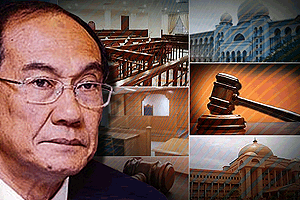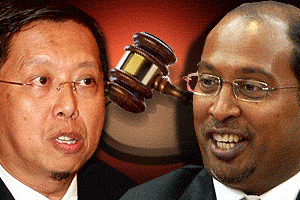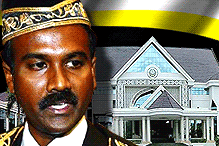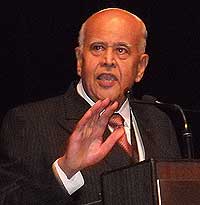INTERVIEW The former chief justice has claimed to have played no role in cases involving the Perak constitutional crisis or those which involved political parties during his tenure.
 Zaki Azmi, who was once the Umno legal advisor and disciplinary committee deputy chairperson, said this was necessary to avoid allegations of bias.
Zaki Azmi, who was once the Umno legal advisor and disciplinary committee deputy chairperson, said this was necessary to avoid allegations of bias.
One case that was closely watched was the suit filed by Pakatan Rakyat’s Mohd Nizar Jamaluddin against the BN’s Zambry Abd Kadir, to determine the legitimate menteri besar of Perak.
In an interview, Zaki insisted that he had no role in this case and that the bench at the Court of Appeal and Federal Court had been decided by his deputy - Court of Appeal president Alauddin Md Sheriff.
“I did not sit on any cases which are not only political, but have a flavour of politics. I did not even constitute the panel. I told my Number Two: ‘You go to constitute (form) the panel. I don't want’.”
The crisis in Perak had unfolded in February 2009, after three Pakatan Rakyat lawmakers resigned from their respective parties and declared themselves as ‘BN friendly’ Independents.
 A new BN government led by Zambry was swiftly sworn in, while Nizar responded by filing a suit seeking a declaration that he was the legitimate menteri besar.
A new BN government led by Zambry was swiftly sworn in, while Nizar responded by filing a suit seeking a declaration that he was the legitimate menteri besar.
On May 11, the Ipoh High Court ruled in Nizar’s favour. The Court of Appeal allowed Zambry’s application for a stay order the next day, leading Nizar’s lawyers to question the swiftness of the procedure.
The High Court ruling was eventually overturned by the Court of Appeal and upheld by a five-member Federal Court panel.
At the time, questions were raised as to why a single judge - Justice Ramly Ali - was arranged to hear the application for a stay order when there were two three-member Court of Appeal panels hearing cases that day.
Asked about this, Zaki again said he was not involved and that the the court registrar had arranged for Justice Ramly to hear the application.
On Nizar’s failed attempt to convince the Federal Court to have a full 11-member bench hear his case, Zaki stressed once more that he was not involved - the composition of the panel had been assigned to Alauddin.
“It was constituted by my Number Two. He (thought) a five-member bench (was) sufficient. (But) if you ask me, why do you need more? Nine, 11, 13, 15 or 21? Does it make sense?
“Maybe out of 13, one or more will decide in their favour (and they will say it) is the correct decision... This is not how we practise law in Malaysia.”
‘No intervention’
When told that the case was bound to deliver a landmark decision due to the nature of constitutional matters raised, Zaki pointed out that other cases had been heard by a smaller bench.
These include a civil suit by then Sarawak Chief Minister Stephen Kalong Ningkan against governor Tun Abang Openg and Tawi Sli, in the Kuching Federal Court in 1966. A three-member bench presided.
Nizar’s suit bears close semblance to Kalong’s legal attempt to hold on to his office. Kalong was challenging the governor’s decision to demand his resignation after 21 out of 42 state legislators had signed letters stating that they no longer had confidence in him as chief minister.
“There are many other more constitutional cases since Malaysia gained Independence and there are so many more political cases, including Stephen Kalong Ningkan's (that were) decided by a three-member panel. Why (has) it become so important to have five, nine or 11 (members)?” asked Zaki.
The norm in Malaysia has been only three judges, while just 10 percent of cases saw a five-member panel. There has been only one occasion where a seven-member Federal Court panel was constituted over a case concerning the burden of proof.
 When pointed out that majority of the Federal Court judges involved in the Nizar suit and another suit brought by former Perak state legislative assembly speaker V Sivakumar (
left
)
were the same, Zaki again stressed that he had no hand in the selection of judges.
When pointed out that majority of the Federal Court judges involved in the Nizar suit and another suit brought by former Perak state legislative assembly speaker V Sivakumar (
left
)
were the same, Zaki again stressed that he had no hand in the selection of judges.
“It was not constituted by me. I am expressing my views as an ordinary person now, not (as) the former chief justice. Many will not agree with me, but there will be many more who will agree with me.
“In Sivakumar's case, as I said, I did not constitute the panel. I do not know whether the President of the Court of Appeal (Alauddin) consulted with then Chief Judge of Malaya (Arifin Zakaria).
“He could have consulted (me) but I (did) not want to know. I did not even bother to ask. Honestly, I (didn’t) try to influence them. I (didn’t). I only know what was reported later, in the newspapers.”
On cases where there might have been conflict of interest, Zaki said he did not handle any matter involving his former law firm, Shahrizat Rashid and Lee.
 “When I was President of the Court of Appeal, the UEM case came (up). Justice Gopal Sri Ram (
right
)
was in the panel (of the Court of Appeal). He reversed the decision by (the High Court).
“When I was President of the Court of Appeal, the UEM case came (up). Justice Gopal Sri Ram (
right
)
was in the panel (of the Court of Appeal). He reversed the decision by (the High Court).
“UEM was my former client and the decision went against my former client. I did not interfere and I did not even constitute the panel. (I directed) the (Court of Appeal) registrar (to) constitute the panel.
“I told the registrar ‘I do not care and I do not want to get involved’. Yet UEM, my former client, lost the case and if I wanted to interfere, that (would have been) the best case to.
“Why don’t you publicise that for me if you want to talk about independence? You should write that the decision went against my client. Please give me credit.”
Although UEM lost its case in the Court of Appeal, the decision was overturned by the Federal Court.
THE ZAKI AZMI INTERVIEW
Zaki: Rulings against gov't show courts are fair
Former CJ Zaki disclaims role in Perak crisis
Zaki: Good judges don't come cheap
YOURSAY: Not being 'involved' won't absolve ex-CJ

